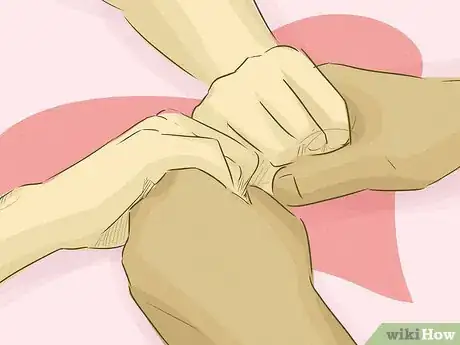This article was medically reviewed by Sarah Gehrke, RN, MS. Sarah Gehrke is a Registered Nurse and Licensed Massage Therapist in Texas. Sarah has over 10 years of experience teaching and practicing phlebotomy and intravenous (IV) therapy using physical, psychological, and emotional support. She received her Massage Therapist License from the Amarillo Massage Therapy Institute in 2008 and a M.S. in Nursing from the University of Phoenix in 2013.
This article has been viewed 34,806 times.
You might feel incredibly frustrated if you care about someone who refuses help. Helping someone with an alcohol problem can be difficult to navigate as you may want to help but not enable them. One of the biggest ways you can help someone is by showing your care and support of them as a person, not as an alcoholic. Be available to listen, offer supportive words instead of judgment, and manage your own reactions to their behavior.
Steps
Changing Your Approach
-
1Educate yourself. Addiction is a chronic problem that leads to poor decision making and problems at home, work, and social life.[1] Many addicts think they can control their behavior yet struggle to do so. They may actively seek escape from stress or worries of life and may not know how else to cope outside of alcohol.
- Alcoholics are not bad people, they are people who struggle to cope with daily life.
- Before you decide to help someone, consider whether they show signs of being an alcoholic. These may include trying to cut back and not being able to, spending a lot of time drinking or recovering from hangovers, engaging in risky behaviors due to drinking, having issues with family and friends because of their drinking, or having to drink more than they used to.[2]
- The effect of alcohol is biphasic, which means that when BAC (blood alcohol concentration) levels are rising, the stimulant properties of alcohol are more pronounced; when BAC levels are falling, the depressant effects of alcohol are more pronounced. When you are approaching a person who has been drinking they likely will have two different reactions: they may feel positive and stimulated when BAC is rising and may feel alone, depressed, or even suicidal when BAC is dropping.[3]
-
2Sustain your support. Affirm any positive choices they make. Point out positive behaviors and steps forward the person makes, even if it doesn't involve treatment. Stay positive in your interactions with the person. Let the person know that they can count on you for support and positive feedback.
- Recovery is often an ongoing process. Even if the person agrees to get help, they may change their mind or experience slip-ups. Support the person in their ups and downs, and support them attending meetings, treatment, and support groups.
Advertisement -
3Avoid certain behaviors. If someone has made it clear to you that they do not want help, don't force the issue. Don't constantly bring up conversations about alcohol. Don't pressure the person, either. While you may interpret the situation as dire, the person may still be in denial about their problems, and your pressuring will likely make them feel more justified in their actions.[4]
- While it can be difficult to engage with someone who is resistant to help, don't avoid the person, either. It may be easier to remove yourself from their life, but you may want to be available for when they are ready to talk.
- Instead of getting down on the person, say, “We care about you and want you to get help.”
-
4Don't take things personally. If the person makes yet another broken promise or lies to you, don't take it personally. Especially if the person is irrational while using, don't get upset or fight with the person. Alcohol can change the person's behavior and make them act in ways that aren't congruent at all times.
- Remind yourself that you love this person and that they are not in a position to be rational.
Interacting with the Person
-
1Be available to listen. Be available to listen when this person needs a friend.[5] Even if the person does not want help now, they may want some support in the future. Let them know that while you don't approve of their alcoholism that you are available to talk and listen if they need it.
- Communicate that you are willing to be a friend when they need friendship.
-
2Express honesty. Share your thoughts and feelings honestly with the addicted person, letting them know how you feel. Put the focus on you and not on them, as this can cause guilt or shame. For example, instead of saying, “You're destroying yourself and making bad decisions” say, “I don't get to see you anymore, which makes me sad. I miss having you as a part of my life.” Let the person know you are worried and are impacted by their drinking.[6]
- Express your willingness to be supportive as well. Say, “I really don't like how alcohol has impacted our relationship. While this is painful for me, I want to support you because I care about you.”
-
3Offer to help. If the person expresses interest in seeking treatment, offer to help them however you can.[7] Help them look up treatment facilities, detoxification programs, support groups, or whatever else they are interested in exploring. Offer to drive them to appointments or support them in certain life changes.
- If the person isn't quite ready for help, make one offer, then wait for them to ask you. If you constantly offer help, the person may become off-put by you and your good intentions.
- Get informed on local resources for alcohol addiction. For example, look up community groups for alcoholism, treatment specialists, and treatment programs. That way, you can be ready to share information with the person.[8]
Responding to Problem Behaviors
-
1Handle crisis situations. If the person is a danger to themselves or others, call emergency services immediately.[9] The person may be acting recklessly or endangering their life or the lives of others. If this is the case, get help immediately. Even if the person does not want help, immediate intervention may be necessary.
- In the USA, call 911; in England, call 999; in Australia call 000.
-
2Set limits. If this person's behavior negatively impacts your life, be clear in setting limits for what is and is not acceptable. For example, do not lie on behalf of the person. Tell the person not to call you or come to your home if they have been drinking. Let them know that you will not give them money under any circumstance.[10] Communicate whatever limits feel appropriate to you.
- While it's difficult to watch someone you care about be destructive, do not enable the person's behavior. Decide how you will be in the person's life and make clear boundaries for your role.
-
3Stage an intervention. Interventions can be a highly effective way of showing the addict that they have a problem and that people are concerned about them. They can help the addict realize that there is a problem and who people care. An intervention can also provide hope by outlining treatment options and facilities available to the person.[11] While some interventions may be beneficial in a one-to-one setting, having the presence of many people who love and care about the person can be impactful.
- Meet with an intervention specialist to help you plan and carry out an effective intervention.
Expert Q&A
-
QuestionHow do you talk to someone about their drinking problem?
 Sarah Gehrke, RN, MSSarah Gehrke is a Registered Nurse and Licensed Massage Therapist in Texas. Sarah has over 10 years of experience teaching and practicing phlebotomy and intravenous (IV) therapy using physical, psychological, and emotional support. She received her Massage Therapist License from the Amarillo Massage Therapy Institute in 2008 and a M.S. in Nursing from the University of Phoenix in 2013.
Sarah Gehrke, RN, MSSarah Gehrke is a Registered Nurse and Licensed Massage Therapist in Texas. Sarah has over 10 years of experience teaching and practicing phlebotomy and intravenous (IV) therapy using physical, psychological, and emotional support. She received her Massage Therapist License from the Amarillo Massage Therapy Institute in 2008 and a M.S. in Nursing from the University of Phoenix in 2013.
Registered Nurse When you choose to talk about the alcohol use disorder, be sure to keep the conversation simple and tell the truth about your feelings.
When you choose to talk about the alcohol use disorder, be sure to keep the conversation simple and tell the truth about your feelings. -
QuestionMy wife is an alcoholic. She has left me for another alcoholic and filed for divorce. What can I do?
 Sarah Gehrke, RN, MSSarah Gehrke is a Registered Nurse and Licensed Massage Therapist in Texas. Sarah has over 10 years of experience teaching and practicing phlebotomy and intravenous (IV) therapy using physical, psychological, and emotional support. She received her Massage Therapist License from the Amarillo Massage Therapy Institute in 2008 and a M.S. in Nursing from the University of Phoenix in 2013.
Sarah Gehrke, RN, MSSarah Gehrke is a Registered Nurse and Licensed Massage Therapist in Texas. Sarah has over 10 years of experience teaching and practicing phlebotomy and intravenous (IV) therapy using physical, psychological, and emotional support. She received her Massage Therapist License from the Amarillo Massage Therapy Institute in 2008 and a M.S. in Nursing from the University of Phoenix in 2013.
Registered Nurse You are brave for seeking help...just asking can be a challenge is a good first step. You cannot put blame on yourself at this point. Blaming yourself or blaming your partner at the time will only put a road block in your healing process. Discuss your situation with a trusting and supportive family member, friend, or a support group. Additionally, a counselor and/or professional help would be a useful addition in your situation.
You are brave for seeking help...just asking can be a challenge is a good first step. You cannot put blame on yourself at this point. Blaming yourself or blaming your partner at the time will only put a road block in your healing process. Discuss your situation with a trusting and supportive family member, friend, or a support group. Additionally, a counselor and/or professional help would be a useful addition in your situation.
References
- ↑ http://blogs.psychcentral.com/addiction-recovery/2012/03/help-the-addict-doesnt-want-help/
- ↑ https://www.niaaa.nih.gov/alcohol-health/overview-alcohol-consumption/alcohol-use-disorders
- ↑ http://hams.cc/dopamine.pdf
- ↑ http://au.reachout.com/what-to-do-when-someone-doesnt-want-help
- ↑ http://au.reachout.com/what-to-do-when-someone-doesnt-want-help
- ↑ https://www.helpguide.org/articles/addictions/overcoming-alcohol-addiction.htm
- ↑ http://au.reachout.com/what-to-do-when-someone-doesnt-want-help
- ↑ http://au.reachout.com/what-to-do-when-someone-doesnt-want-help
- ↑ http://www.helpguide.org/articles/addiction/alcohol-addiction-treatment-and-self-help.htm




































































